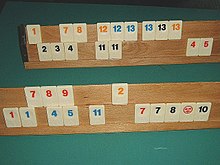

|
|
Undid revision 313972099 by 78.162.22.230 (talk)
|
||
| Line 5: | Line 5: | ||
==References== |
==References== |
||
* [http://www.pagat.com/rummy/okey.html Detailed rules of the game] |
* [http://www.pagat.com/rummy/okey.html Detailed rules of the game] |
||
* [http://www. |
* [http://www.gamesfromeverywhere.com.au/rules/Okey_History_Rules.pdf Rules & History] |
||
[[Category:Tile-based board games]] |
[[Category:Tile-based board games]] |
||

Okey (pronounced "okay") is a tile-based game, very popular in Turkey. It is almost always played with 4 players, though in principle can be played with two or three. It is very similar to the game Rummikub as it is played with the same set of boards and tiles but with different rules. The game apparently evolved from the original Rummikub through cultural contacts of GastarbeiterinGermany.[citation needed] In Turkey and among Turkish communities abroad, it is very popular not only at homes but also at coffeehouses (visited mostly by men).
This board game-related article or section is a stub. You can help Wikipedia by expanding it. |
This Turkey-related article is a stub. You can help Wikipedia by expanding it. |